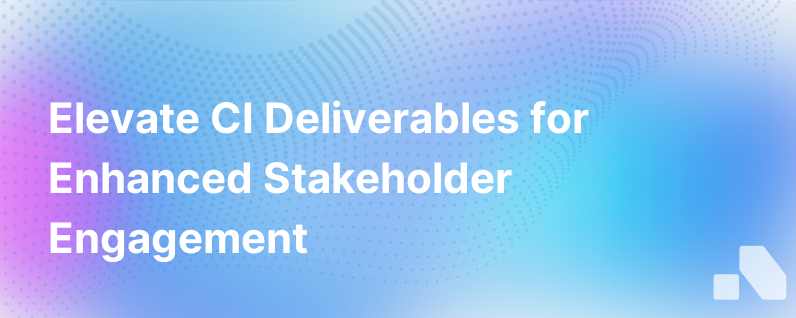
In today's fast-paced business world, the ability to adapt and respond swiftly to market demands is a game changer. It's no longer a luxury but a necessity to remain competitive and relevant. Leveraging Continuous Integration (CI) tools and practices is one way, like never before, to realize faster time to market without compromising software quality. However, driving engagement with CI deliverables demands a comprehensive approach and a nuanced understanding of your team's dynamics.
In this article, we'll explore practical strategies to drive CI deliverable engagement among team members for more effective collaboration and process optimization.
Understanding Continuous Integration (CI)
In essence, Continuous Integration revolves around integration of code into a shared repository regularly. Each check-in is validated by an automated build, allowing teams to detect, and address, issues early. Such a practice goes a long way in reducing the complexity of integration and preventing code divergence, thereby significantly improving productivity and efficiency.
The Role of CI Deliverables
CI deliverables play a fundamental role in the development lifecycle. A deliverable in this sense represents any output or milestone produced as part of the CI process. This can include test reports, integration summaries, and performance snapshots, to name a few.
These deliverables need to be highly interactive and engaging to inspire developers and stakeholders to not just appreciate but fully engage in the process.
Strategies to Drive Engagement
1. Interactive Dashboards: One of the key features of an engaging CI system is an interactive dashboard. Dashboards infused with real-time, graphical representations of data help teams understand key metrics in an intuitive manner. This incites curiosity and involvement in the ongoing development process. Visualizing data aids in quickly spotting trends, bottlenecks, and discrepancies, promoting swift rectification.
2. Gamification: Gamification is a powerful tool to boost engagement. It involves transforming mundane tasks into an enjoyable experience by associating them with game dynamics. In the context of CI, this approach could translate to recognizing developers who consistently deliver high-quality code or awarding points for successful, timely integrations.
3. Real-time Alerts: Whenever a build fails or performance issues are detected, real-time alerts should be sent out to relevant team members. This helps instill a sense of accountability, prompting them to promptly address the issue. Timely notifications can spur interactions and cooperation among team members, thus aiding in the faster resolution of issues.
4. Regular Demos: Regular demonstrations of new features or bug fixes serve to keep the momentum going and instill a sense of progress. They also provide an opportunity to address questions, clarify doubts and gather feedback, which promotes active involvement and fosters a collaborative environment.
5. Training and Documentation: Comprehensive documentation and training are essential to understand the CI process and its deliverables. Providing ample resources and tutorials can empower your team to fully leverage CI's potential.
The prominence of AI in CI Engagement
While these strategies can certainly spark engagement, an intelligent platform like Aomni can take it a notch higher. Aomni merges the power of AI with CI, automating repetitive processes, providing actionable insights, and personalizing workflows.
In a market flooded with CI tools, Aomni differentiates itself in its user-centric delivery of CI deliverables. It offers personalized content based on the user's role and requirement with just 15 minutes of setup. With the smart processing of data and pushing timely updates, Aomni makes the management of CI deliverables engaging and highly efficient.
Wrapping Up
Driving engagement with CI deliverables is essential to harness the full potential of Continuous Integration. This fosters improved team collaboration, accountability, and ultimately, higher productivity. Meanwhile, platforms such as Aomni can further elevate the engagement with CI deliverables, adding a layer of personalization that inspires adoption and utilization.
By incorporating these tactics into your workflow, you're not only driving engagement with CI deliverables but truly creating a culture of continuous improvement — a culture that will pay dividends well into the future.